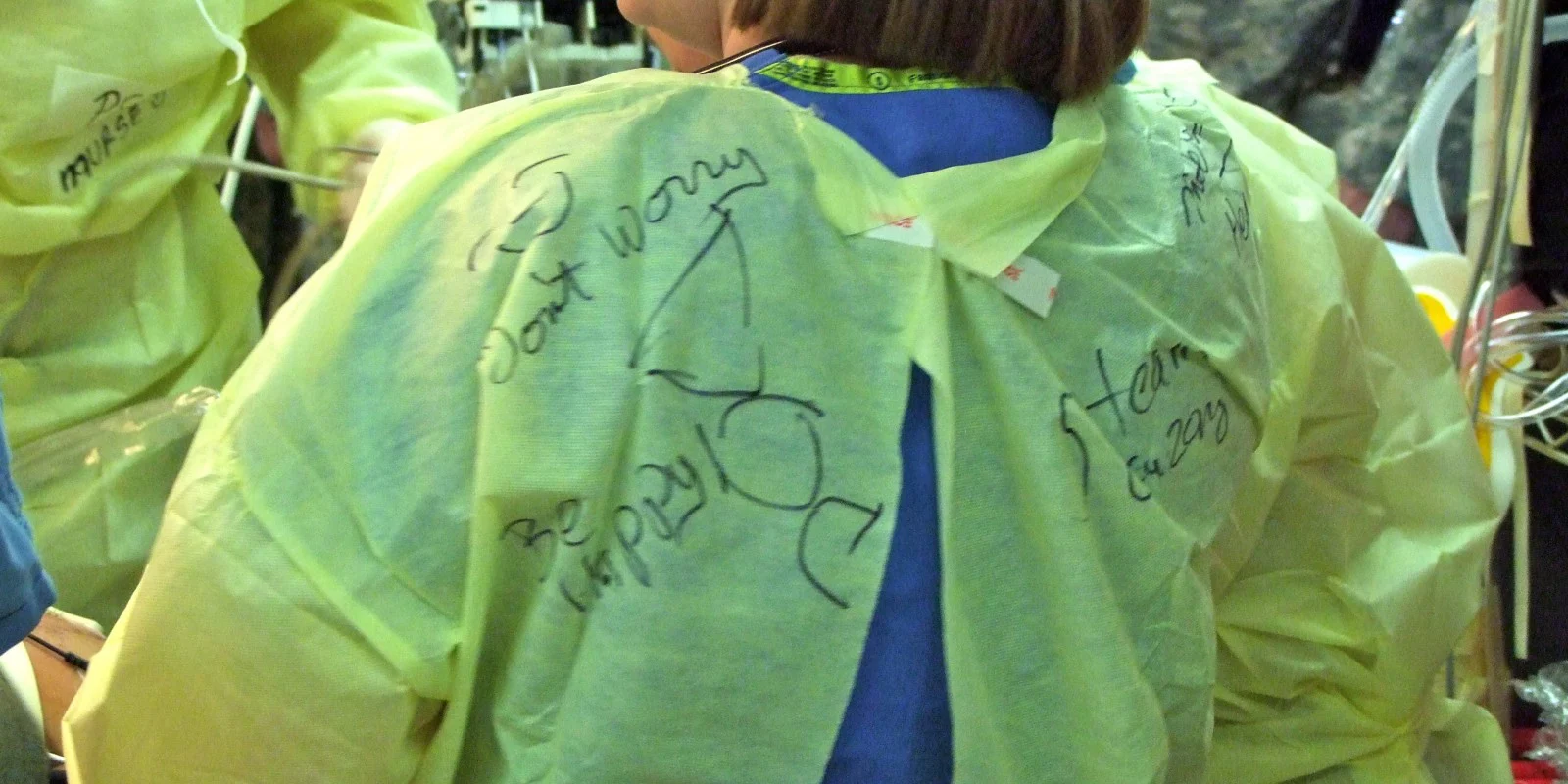
The question comes again, this time from a distant relative from across the table at Olive Garden. “You went to Iraq, right? Was it hard?” Over breadsticks and salad, I pause, wondering how to answer correctly. You’d think I’d have something rehearsed; every time my service comes up, this inevitable question follows.
I look into eyes eager for a Clint Eastwood tale of guts and glory. Christmas music fades into the background as I drop my gaze to the table.
I think back, thousands of miles, hundreds of nightmares ago. I start to mentally correct her, that I went to both Iraq and Afghanistan as an emergency medicine physician.
As my mind sputters to find a rhythm, images start and stop like an old movie. I was never outside the wire, never in battle, but I saw the results every day. So many young men, so many wounds. Eyes staring up into mine, afraid, in pain. “You’re safe. I’m Dr. McGowan, and I’m going to take care of you.” Assess the airway, listen for breath sounds, hold the C spine and roll. “X-ray!” And the buzz of the machine, as another dose of radiation passes through me.
I see the tiny corner of my shared room, 80 square feet to call my own of a country where everything was trying to kill me. I feel the weight of six months of never having a door to close, never a shred of privacy or a place to be alone. I see the pictures of my kids, a half a world away, to remind me what I need to get back to.
5.56 rounds echo in my ears as I lay in bed and listen to the gunfight just outside our gates. On the eve of the second democratic elections in Iraq, the dissidents are protesting the results. A firefight erupts right outside our perimeter. I wearily pull on my boots, knowing casualties are coming. It had been a long day treating IED victims, Iraqis with fingers still stained from their voting ink and bloody from the bombs planted to disrupt the process. Every November makes me angry, because these Iraqis died for their right to participate in something that many Americans can’t even be bothered to do.
Rifle shots don’t bother me, as a general rule. My ear can pick out a NATO round, instinctively knowing the difference between a deer rifle and one hunting people. What does bother me is that alarm on the iPhone. It’s the one that sounds like the incoming rocket attack alarm in Afghanistan. Just start scrolling through your various alarm options; you’ll know when you get the right one. You’ll see me startle, and my pulse will pound in my throat.
That sound will forever be tied to June 18, on a loop reel in my memory. The enemy got lucky, and hit a bus stop with one of their rocket pot shots. We work so hard to save them. They were injured just yards from our ER, and even minutes was too long to make a difference. One by one, the heroic efforts slow, then stall, then stop. From chaos and noise and purpose comes silence, defeat, and blood dripping on my boots, smeared by treads onto the floor.
Blood looks the same, no matter the size of the patient or nationality. Good guy or enemy, adult or child, it all begins so bright and then clumps, clots, darkens. It doesn’t matter how it started: gunshot, land mine, car accident, IED. The end result of blood, rocks embedded into skin, dirt in hair and eyelashes and ears, all becomes indistinguishable.
What is unique is the smell. You can tell a serious head wound by the slightly salty smell from the exposed brain. Local nationals exude a unique blend of curry and livestock. Abdominal wounds are announced by the sad smell of fecal material. Overlying it all is sharp gunpowder and sometimes explosives, buried under dirt and mud.
This generic restaurant I’m sitting in now feels ok, because I’m tucked back in a booth and I’m close to an exit. I’ve already checked it out, and I know how to get there. I remember the dining facility a half a world away. The serving line there labeled any pork products, as we were in a Muslim country. I was always disturbed by the bacon, labeled “May contain pork.” If bacon doesn’t contain pork, what does it contain? Half way through my trip to Oz, they remodeled the dining room. It finally dawned on me that they were putting in bulletproof divider walls, in case of an active shooter situation. Those walls simultaneously comforted and terrified me. I don’t think the walls where I’m sitting now would provide much cover.
I drift back to the present, having lived that silent movie so many times already it only takes a microsecond. I offer up a non-committal “I’m proud of the guys I was able to help there” and leave it at that. It’s never the answer people hope for when they ask that question, but the real truth is still too raw, too high definition, to look at, dissect, discuss with someone who has never been there.
This fake Italy, with its expansive menu, is not the place to lay bare the ugliness of war, as only doctors see it after chaotic violence ends and the methodical violence of medical care starts. Trying to explain war to someone who has never been is like trying to explain colors to a blind person, or opera to the deaf. There are no words for some experiences; for those who have been, no words are necessary.
So, if you ask me, please don’t be offended if I give vague answers. I’m not sure how to respond yet without calling my own demons, and I’m not sure you really want to know the price paid for your freedom.






